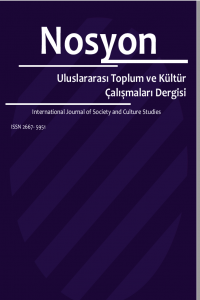Mohamed Nedali’nin La Maison de Cicine adlı eserinde disiplin mekanı ve yer olmayan mekan
Çalışmamız Mohamed Nedali'nin cicine evindeki alanı hedefliyor. Köy, bu hikayede kendisini bir mutluluk ve sakinlik yeri, pastoral güzellikte bir manzara olarak kabul ettirmiştir. Bununla birlikte, hikaye daha sonra, kahramanın evini yok eden ve tüm köyü kıyamet manzarasına dönüştüren bir tufan olacağı için bunun tersine döndüğünü doğrular. Kente gelince, köyde yaşanan lanetin aynısına maruz kalmış gibi görünüyor. Idar'ın kalması, kahramanın Charybdis'ten Scylla'ya geçmesi nedeniyle tuzaklarla dolu. Yaşanılmaz ve kıyamet, köy sizi terk etmeye zorluyor, bu şehir için de geçerli, kahramanı neredeyse aynı sorunlarla karşı karşıya buluyor. Mekân, hikayenin kahramanına öğrenme ve doğanın sırlarına inisiye olma imkânı vermesi bakımından kendisini bir anlam verici olarak kurduğunu da söyleyebiliriz. Yer düşmanlık, köktencilik, özgürlük ve güvenliğin kıt para haline geldiği bir yer haline geldi. Şeyhin müdahalesi, yeri köktenciliğin egemen olduğu bir yere dönüştürür. Dar Louriki'nin diğer oda arkadaşları tarafından kontrol edilen ve hükmedilen Idar, kendisini dışarıdaki yaşamla bağlantılı verimli deneyimlerden mahrum bulur. Oradan, belirli bir şekilde Michel Foucault'nun “iktidar makinesi” dediği şey tarafından kontrol edildiğini ve egemen olduğunu söylemek. Bu nedenle bu, Dar Louriki'nin disipliner bir alana benzediği fikrini pekiştiriyor. Hikayenin çoğu Dar Louriki'nin evinde geçiyor, bu "otel türü" tüm hikayenin ifade edildiği bir yer olarak duruyor. Bir geçiş yeri veya bir tür mola yeridir.
Disciplinary space and non-place in La Maison de Cicine of Mohamed Nedali
Our study targets the space in Mohamed Nedali's cicine house. The village has imposed itself in this story as a place of happiness and calm, a landscape of idyllic beauty. However, the story later testifies that this is turned upside down in that there will be a deluge destroying the protagonist's house and transforming the whole village into an apocalyptic landscape. As for the city, it seems that it is subject to the same curse as that experienced in the village. In that the stay of Idar is well strewn with pitfalls in that the protagonist passes there from Charybdis to Scylla. Unlivable and apocalyptic, the village forces you to leave, this is also the case for the city, and the protagonist finds himself confronted with almost the same problems. We can also say that the space sets itself up as a giver of meaning in that it grants the protagonist of the story the possibility of learning and being initiated into the secrets of nature. The place has become one of hostility, of fundamentalism, a place where freedom and security become scarce currency. The intrusion of the sheikh transforms the place into a place dominated by fundamentalism. Controlled and dominated by the other roommates of Dar Louriki, Idar finds himself deprived of fruitful experiences linked to life on the outside. From there, to say that it is in a certain way controlled and dominated by what Michel Foucault calls “the machinery of power”. This therefore reinforces the idea that Dar Louriki is akin to a disciplinary space. Most of the story takes place in the house of Dar Louriki, this "kind of hotel" stands as a place of enunciation of the whole story. It is a place of passage or a kind of stopover.
___
- Appadurai, A. ([1996] 2001). Après le colonialisme. Les conséquences culturelles de la globalisation, Paris, Payot.
- Augé, M. (2009). Pour une anthropologie de la mobilité, Paris, Payot.
- Augé, M. (1992) .Non-lieux. Introduction à une anthropologie de la surmodernité. Paris : Seuil.
- Barthes, R. (1966). Introduction à l'analyse structurale des récits. Communications, 8(1), 1-27.
- Eco, U. (2014). Lector in fabula. Grasset.
- Fischer, G-N, La psychologie de l’espace, Paris, Presses Universitaires de France, 1981, coll. « Que sais-je».
- Foucault, M. (1975). Surveiller et punir (Vol. 1, pp. 192-211). Paris.
- Moles, A. A., & Rohmer, E. (1978). Psychologie de l'espace.
- Nedali, Mohamed (2010) "La Maison de Cicine." L’Aube.
- Poulet, G. (1982). L'espace proustien (pp. 75-94). De Gruyter Mouton.
- Urry, J. (2005). Sociologie des mobilités, Paris, Armand Colin.
